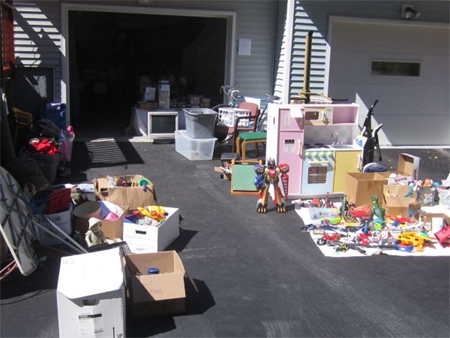This past weekend, my family had our long-delayed garage sale. It’s been two and a half years since I went through practically everything I owned and sorted it all into “keep” and “don’t keep”: the trick in the time since has been finding and setting aside enough time to organize, price, advertise, set out, and sell those items. In that couple of years, too, I’ve found that there are a number of additional objects I had that I could do without, and so along with everything else there needed to be another round of decluttering.
However, we did it all, and we survived. While I hope to not have to do another sale for a number of years, I feel like I’ve learned some useful lessons about running one successfully, and I’ll be putting that information in a separate post. This post, however, is about the emotional side of garage sales, because for many of us, getting rid of our old stuff is even a bigger emotional task than it is a physical and organizational one.
In the course of this sale, I’ve had to face a few truths about myself, my stuff, and my relationships, and it all continues to be challenging and sometimes even painful. Here’s what I think I’ve learned:
1. I’m not going to get what I paid for it: that money is gone
It’s nice to imagine when I buy something useful and well-made that I’m not really saying goodbye to my money: I’m just letting it go away for a little while. Eventually, when I no longer need the thing, I can just sell it and recoup much of my expense, right?
You probably aren’t falling for that and know as well as I do that the minute we take off the plastic wrap, whatever it is we bought no longer equals money: all it’s worth is its use to us plus sometimes a greatly-reduced resale value. Yet many of us find ourselves saying (or thinking) “But I paid ___ for that!” It’s hard to let go of the idea that things are worth what we paid for them, but at least in monetary terms, they hardly ever are. Maybe if you’ve recently bought a used Kindle Fire or something, you can get away with recouping what you paid for it, but that kind of thing is the exception, not the rule.
The hardest things for me to get used to losing value on, surprisingly, weren’t even mine: they were my son’s old toys. I would look at something and think “I remember when he was absolutely dying to own that,” and how we (or a relative at a birthday, say) had paid $50 or whatever it was for the item that was now sitting in our driveway on a sheet with a little sticker on it saying “$3.” It’s a hard lesson to learn, this evaporation of value, but it’s worth knowing–especially if it helps guide us into buying less stuff we don’t really need or won’t be able to use well.
2. The money I make won’t justify the time and effort, and that’s OK
One of the things I’ve been avoiding energetically is analyzing what my income per hour has been on this garage sale project. I’m not really making money in a meaningful way from doing this. What I’ve reminded myself, over and over (and it has helped), is that my payoff is in organization, space, peace of mind, and closure. All those objects in my life that have been hanging question marks (What do I do with this? Is it worth anything? How do I get rid of it? Do I really need it after all?) are being resolved into completed episodes of my life. Even if we hadn’t made a cent, all of the work was still necessary to get our lives back in order.
3. Bringing out old things brings out old thoughts
It was hard for me, during the sale, to relive some of my parenting from years gone by. I certainly don’t consider myself a world-class parent now, and currently I’m much, much better at parenting than I was years ago. Once again my son’s old toys gave me the most trouble: I remembered times when I’d been a just plain crummy dad. He used to have trouble sleeping starting when he was around 3, and I’d get angry when an hour after his bedtime he’d wander out into the living room. What I really wish I could do is go back in time and force some sense into my then-self, help myself realize that a kid who has trouble falling asleep probably needs some additional attention, affection, or comfort, and that a little patience would probably see the problem through much more handily and with much better impact for my kid than anger would. Other people might have to face reminding themselves of people they loved who had died, or relationships that went sour, or projects that disappointed. It’s hard stuff, sometimes, but it’s certainly a good thing to work through those old pains when we can and feel we’ve made our peace with them.
4. Giving things to people who can use them is kinda beautiful
One of my biggest challenges is my books: I have hundreds of books I no longer need that must have cost me at a thousand or two thousand dollars or more over the years, and I have been really attached to the idea of getting some money for them. When I asked about selling or giving away used books on Facebook, though, a number of friends came back with a series of terrific ideas (which I’ll detail in a separate post): schools in my area that could use them, hospitals, homeless shelters, bookmobiles … I realize that far better than making a little bit of money from my unneeded things, I can actually get them to people who want or need them. The eight bags of clothes in the back of my car that are on their way to Goodwill or the boxes and boxes of books I can donate so that suddenly there will be all these great new things to read just where people need them … that’s almost magical, you know? I like the idea of charity, but don’t get to do nearly as much of it as I’d like. Here, suddenly, is a beautiful opportunity to give from a position of real (but non-monetary) wealth. What a huge improvement over boxes of books taking up space and never getting read!
I know that for many of you out there, garage sales aren’t this grueling. This is the first one I’ve had in years, and future sales probably won’t involve all the same memories and clutter. My point, though, isn’t that garage sales are always hard–it’s that decluttering our homes and lives goes with the difficult process of decluttering parts of our minds, and that if we’re having trouble with one of those things, it may help to turn our attention to the other.
It just takes a bit of courage. And time. And maybe a garage.




